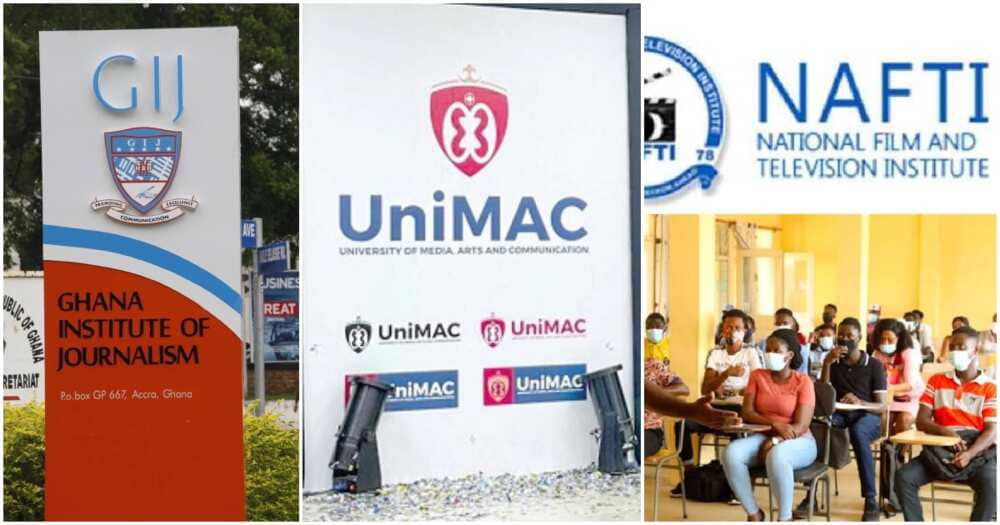The Chief Executive and Rector of GH Media School, Leslie Addo-Listowell has suggested that the National Film and Television Institute (NAFTI), the Ghana Institute of Journalism (GIJ) and the Ghana Institute of Languages were amalgamated into one university due to the threat his institution posed to them.
He made this statement in an interview with Irene Adubea Aning on Joy Learning‘s The Career Trail on Saturday, November 25.
Mr Addo-Listowell established that although there were other good media schools in operation before GH Media School was founded, he was unafraid of rivals due to his experience in marketing.

“I will say that the marketing gave me that hope. When I started, it was Abro Media and Creative Land, they were all in Dansoman. So I realised that proximity will help me because I am at Achimota. They were the giants in the industry. It got to a time they were looking up to me,” he said.
Addo-Listowell asserted that in the short time of its establishment, GH Media School has raised the bar for journalism and production, endangering the viability of the established media schools and leading to the merger of the Ghana Institute of Journalism (GIJ), the National Film and Television Institute (NAFTI), and the Ghana Institute of Languages.

“Because of GH Media School, where we have the Production Department and the Journalism Department, it caused NAFTI and GIJ to come together to form their university. One of the factors was that GIJ did not have production people to handle production so practicals were a problem and NAFTI did not have people to act and do what they are supposed to do for them. So we are having production on one arm and journalism on the other. Now coming together, I am telling you it's because we started posing a threat in the industry.”
Comparing GIJ and NAFTI to the resources GH Media School has made available, Mr Addo-Listowell contended that his students are opened to better media employment options.
“We started doing wonderful things, when you see students, they just come and learn for two years and you are in school for four years, they are two years and they are taking the job. They are going in there. I am telling you that when people are looking for production students they come to me. I have slots for animators that I have not been able to fill. I have slots for editors. In fact, I have people who are in queue waiting for my next batch of students to finish so that they can get animators and editors,” he stated.

The rector also emphasised that GH Media School’s ability to stand against competitors like NAFTI and GIJ was because of its emphasis on practical learning as opposed to theory.
“So you are in school learning all the theories, some people even learn the mechanism in the camera but they have not seen the camera before. No, I am not doing mechanism in camera. I am teaching you how to operate the camera. They will be in school for four years and in two years, you are there taking the job and that was what I was doing”, he indicated.
While applauding the GIJ and NAFTI merger, Mr Listowell stated that he is not perturbed because he is now training a large number of students with emphasis on ‘job creation’ rather than ‘job searching.’
The GH Media School, a private training school not at the level of a tertiary educational institution, was established in 2014. Meanwhile, checks by Myjoyonline.com indicate that discussions about the GIJ/GIL and NAFTI merger, started as far back as 2013, by which time GH Media School had not been set up.
GIJ was established in 1959, whereas NAFTI was set up in 1978, and the Ghana Institute of Languages, GIL in 1961.
GIJ, GIL & NAFTI Merger
The Ghana Institute of Journalism (GIJ), the National Film and Television Institute (NAFTI) and the Ghana Institute of Languages (GIL), were merged into the University of Media, Arts and Communication (UniMAC) by an Act of Parliament in 2022.
But the draft bill was first assented to by President Akufo-Addo in 2020.
The goal of the merger was to ensure that the three institutions which were offering similar programmes come under one umbrella instead of operating differently.
The newly established one-stop-shop specialized tertiary academic institution for the training of professionals in media, arts, and communication studies, promises to be a centre of excellence in the West African sub-region.
UniMAC seeks to provide premier comprehensive teaching and learning model in the ever-changing media communication industry, using leadership skills, best practices, research, and practical hands-on experiences.
Latest Stories
-
NPP needs a strong party to produce a president, not just a flagbearer – Patrick Boamah
5 minutes -
Fitch Solutions revises Ghana’s average inflation in 2025 to 17.2% – Fitch Solutions
12 minutes -
Fitch Solutions revises Ghana’s growth rate upwards to 4.9% in 2025
19 minutes -
Africa World Airlines expands regional operations to Ouagadougou from July 1
35 minutes -
The 60 MPs believe Bawumia is NPP’s best bet for 2028 – Dominic Nitiwul
41 minutes -
Frederick Asare parts ways with Asante Kotoko
59 minutes -
97% of agencies faced major creative campaign challenges -PMI Survey
1 hour -
Yaw Nsarkoh calls for overhaul of political parties to safeguard Ghana’s democracy
1 hour -
NPP vows to enforce discipline ahead of January 2026 presidential primary
1 hour -
Belgian league was a good opportunity to show my talent – Lawrence Agyekum
1 hour -
Yaw Nsarkoh decries decline in media standards
1 hour -
Yaw Nsarkoh calls for urgent chieftaincy reforms to strengthen Ghana’s democracy
2 hours -
Intellectuals must reclaim their role in strenghtening democracy in Ghana- Yaw Nsarkoh
2 hours -
Yaw Nsarkoh slams Ghana’s ‘Santa Claus Democracy’, warns against over-monetised politics
2 hours -
OSP charges four persons over attempted hijack of rice containers at Tema Port
2 hours

